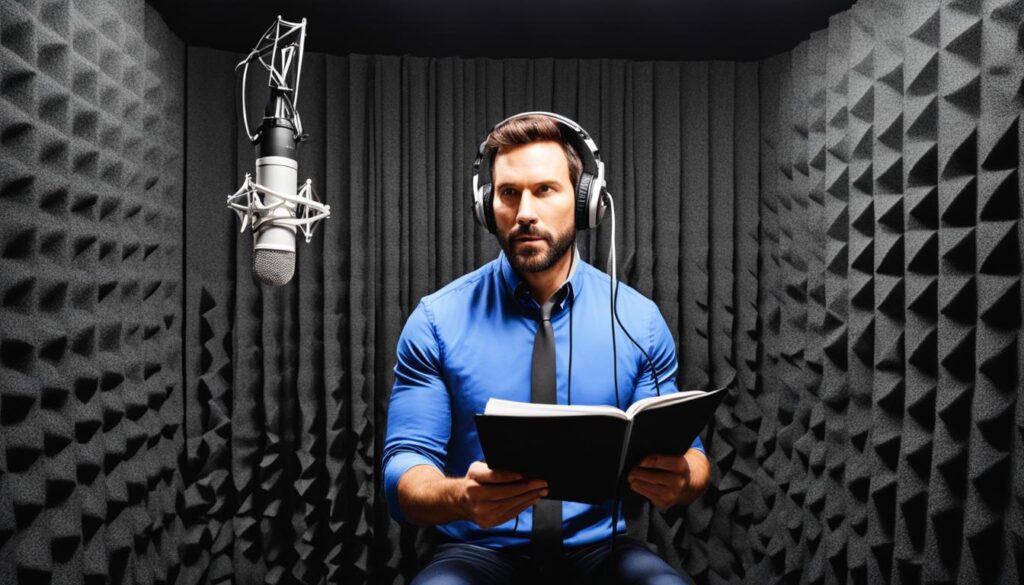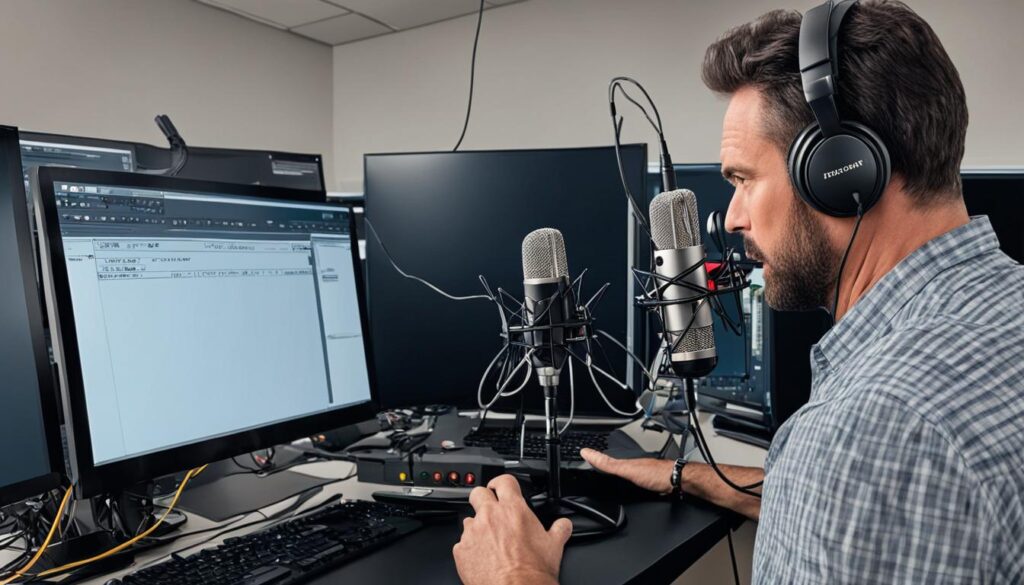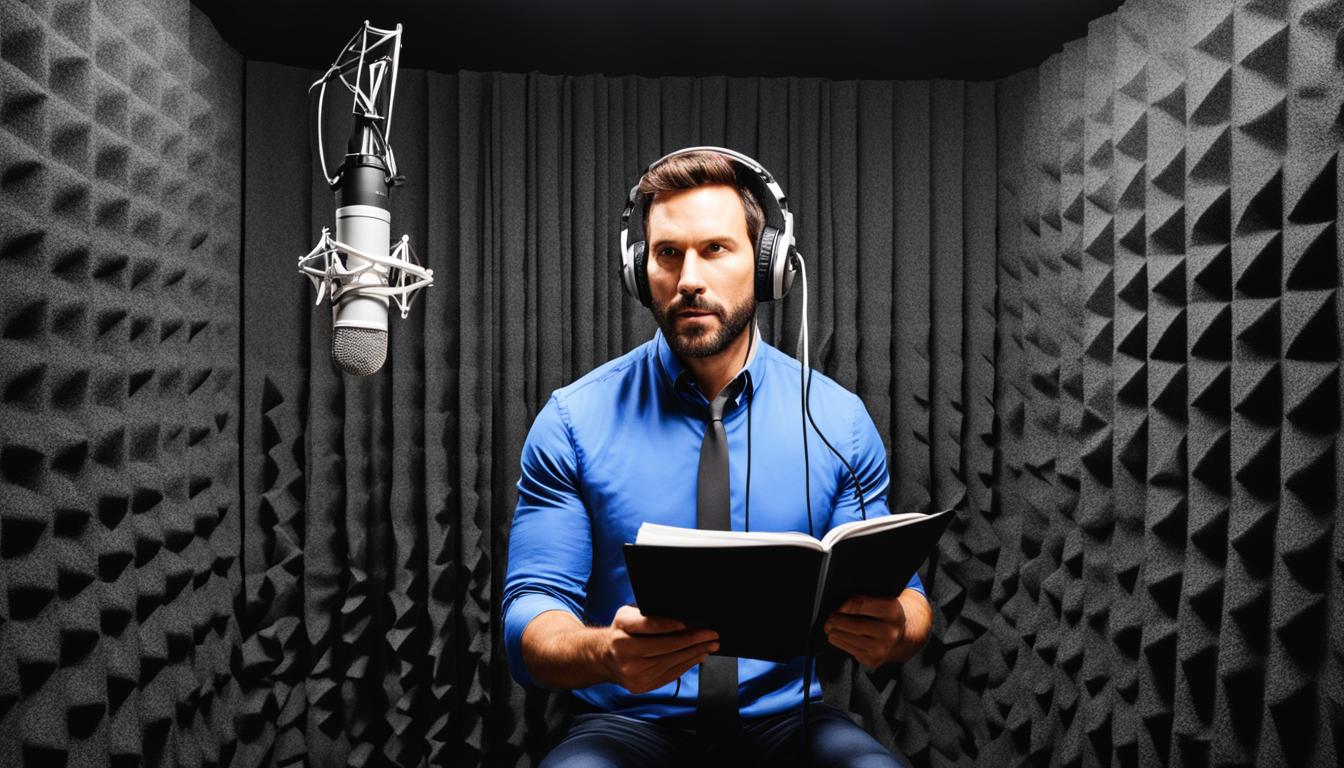Audiobook narrators face numerous technical challenges during the recording process. From creating a suitable recording environment to dealing with background noise and distractions, managing microphone and audio equipment, addressing vocal fatigue, and adapting to various text formats and character voices, these challenges can be daunting.
Despite these obstacles, successful audiobook productions require audiobook narrators to overcome challenges, ensure high-quality recordings, and deliver engaging and captivating performances that resonate with their audience. To understand the skill and dedication that audiobook narrators bring to their craft, let’s explore how they overcome these technical challenges.

Creating a Suitable Recording Environment
One of the most crucial elements for high-quality audiobook recordings is creating a suitable recording environment. A recording environment that is not optimized can lead to unwanted background noise, echoes, and reverberations, all of which can negatively impact the audio quality.
Soundproofing
Soundproofing your recording space is an essential step in creating a suitable recording environment. This process involves installing special materials like acoustic foam, which absorb sound waves and prevent them from bouncing back into the recording space. In addition to acoustic foam, you can also use soundproof curtains and blankets to block out external noise.
Acoustics
Acoustics are equally as important as soundproofing when creating a suitable recording environment. The right acoustics can drastically improve the sound quality of your audiobook recordings. Consider using diffusers and bass traps that help to control the reflection of sound waves, ensuring that the sound is consistent throughout the recording space.
Professional Recording Equipment
Investing in professional recording equipment is a must for achieving optimal audio quality. Good quality microphones, headphones, and digital audio workstations (DAWs) are all vital tools for a successful recording session.
“A recording environment that is not soundproofed and optimized with quality acoustics will make it difficult to achieve excellent audio quality. It’s essential to invest in professional recording equipment and take the time to optimize the recording space to ensure that the finished product is of the highest quality.”
Dealing with background noise and distractions
Background noise and distractions can significantly impact the quality of audio recordings for audiobooks. To minimize these challenges, audiobook narrators need to employ various strategies during recording sessions.
Using noise-cancelling headphones
One effective method for managing background noise is to use noise-cancelling headphones. This type of headphone uses advanced technology to counteract external sounds, allowing the narrator to focus on recording without interruption from background noise.
Scheduling recording sessions during quieter times
Another approach for reducing distractions is to schedule recording sessions during quieter times of the day. This can be especially useful for narrators who work from home or in a shared workspace where noise levels may vary throughout the day.
Creating a soundproof recording environment
Finally, creating a soundproof recording environment can be an effective long-term solution for reducing background noise and distractions. This involves carefully selecting the recording space, insulating walls for sound reduction, and avoiding hard surfaces that reflect sound waves.
By employing these strategies, audiobook narrators can ensure that their recordings are of the highest quality possible, with minimal background noise and distractions.
Managing microphone and audio equipment issues
When recording an audiobook, microphone issues and audio equipment malfunctions can often lead to significant disruptions during the recording process. Common occurrences such as low-quality audio, static, or microphone malfunctions can ultimately compromise the quality of the final recording.
Fortunately, audiobook narrators can minimize these technical difficulties by adhering to specific troubleshooting techniques. For instance, checking that the microphone is correctly connected and positioned can resolve any potential microphone issues. Additionally, before recording, ensuring that all audio equipment is calibrated correctly should prevent malfunctions from occurring.
To further address these issues, audiobook narrators may wish to consult online forums or seek assistance from experienced audio technicians. Conducting regular maintenance on all audio equipment is also a proactive measure to avoid potential interruptions during the recording process.
Overall, maintaining high-quality audio equipment and troubleshooting any potential issues is crucial for audiobook narrators to deliver outstanding audiobook productions that capture the listener’s imagination.

Addressing Vocal Fatigue and Maintaining Energy
Audiobook narration may sound easy, but it can be a physically demanding profession. Narrators spend long hours recording, which can lead to vocal fatigue and exhaustion. Here are some practical tips for maintaining vocal health and energy levels:
- Stay hydrated: Drink plenty of water to keep your vocal cords hydrated. Avoid caffeine and alcohol as they can dry out your throat.
- Warm up: Warm up your voice with some simple exercises, such as lip trills, tongue twisters, and humming. This will help to reduce the strain on your vocal cords and prevent injury.
- Take breaks: Take regular breaks during long recording sessions to rest your voice. Use this time to stretch and move around to keep your energy levels up.
- Use proper techniques: Use proper breathing techniques while narrating to improve your energy levels and maintain vocal health. Avoid strain on your throat by using abdominal breathing and proper posture.
- Practice vocal care: Take care of your voice by avoiding shouting or whispering. Use a humidifier to keep the air moist and avoid exposure to irritants like smoke or pollution.
By following these tips, you can maintain your vocal health and energy levels, ensuring that you can deliver high-quality audiobook recordings.
Adapting to Different Text Formats and Character Voices
One of the most challenging aspects of audiobook narration is adapting to different text formats and character voices. Narrators must be adaptable and versatile to bring text to life and make characters sound distinct and authentic.
Some common text formats include fiction, non-fiction, technical manuals, and biographies, each with its unique style, tone, and pacing. Narrators must understand each format and adjust their delivery accordingly. For instance, they may need to slow down for technical manuals or adopt a more dramatic tone for fiction.
Creating unique voices for each character is another challenge. Narrators must not only differentiate between male and female characters but also bring out their personalities and emotions. They rely on techniques such as changing pitch and tone, or using regional accents or speech patterns to create unique voices.
“Adapting to different text formats and character voices requires a combination of creativity, research, and vocal control. It’s essential to capture the essence of the author’s intent while creating an engaging and authentic performance,” says Bob Johnson, a veteran audiobook narrator.
Overall, audiobook narrators need to be adaptable, creative, and versatile with the ability to switch between different genres, voices, and delivery styles seamlessly. With practice and dedication, they can overcome the challenging task of adapting to different text formats and character voices to produce a captivating audiobook for their audience.
Conclusion
In conclusion, the art of audiobook narration involves more than just reading aloud. Narrators must navigate several technical challenges during recording sessions, from creating a suitable recording environment to overcoming microphone and audio equipment issues. They must also adapt to different text formats and character voices while preserving their vocal stamina and energy levels.
But despite these obstacles, audiobook narrators are known for their resilience and adaptability. Their commitment to delivering high-quality audiobook recordings is a testament to their dedication to the craft. To all the audiobook narrators out there, keep up the excellent work, and know that your hard work is appreciated by listeners around the world!
FAQ
How do audiobook narrators overcome technical challenges during recording?
Audiobook narrators overcome technical challenges during recording by creating a suitable recording environment, addressing background noise and distractions, managing microphone and audio equipment issues, addressing vocal fatigue, and adapting to different text formats and character voices.
What is the importance of creating a suitable recording environment for audiobook narrators?
Creating a suitable recording environment is crucial for audiobook narrators as it ensures optimal audio quality. Soundproofing, considering acoustics, and using professional recording equipment help mitigate external noise and enhance the overall audio production.
How can audiobook narrators minimize background noise and distractions during recording?
Audiobook narrators can minimize background noise and distractions by using noise-cancelling headphones, scheduling recording sessions during quieter times, and implementing techniques to reduce or eliminate unwanted sounds in the recording space.
What can audiobook narrators do when faced with microphone and audio equipment issues?
When faced with microphone and audio equipment issues, audiobook narrators can troubleshoot problems such as low-quality audio, static, or microphone malfunctions. Troubleshooting may involve checking connections, adjusting settings, or seeking professional assistance when needed.
How can audiobook narrators address vocal fatigue and maintain energy during long recording sessions?
Audiobook narrators can address vocal fatigue and maintain energy by practicing proper vocal care, including warm-up exercises, staying hydrated, taking breaks, and using techniques to preserve vocal stamina throughout the recording process.
What challenges do audiobook narrators face when adapting to different text formats and character voices?
Audiobook narrators face challenges when adapting to different text formats and portraying multiple character voices. They must employ their adaptability to bring text to life and create distinct voices for each character, ensuring a compelling and engaging listening experience.
